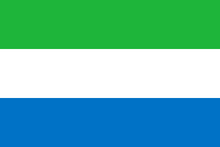
Sierra Leone (i/sɪˈɛərə lɪˈoʊni, -lɪˈoʊn/),[5] officially the Republic of Sierra Leone, is a country in West Africa. It is bordered by Guinea in the north-east, Liberia in the south-east, and the Atlantic Ocean in the south-west. Sierra Leone has a tropical climate, with a diverse environment ranging from savannah to rainforests. Sierra Leone has a total area of 71,740 km2 (27,699 sq mi)[6] and an estimated population of 6 million (2011 United Nations estimate).[7][8] Freetown is the capital, largest city, and its economic and political centre. Bo is the second largest city and second major economic center in the country. The country is divided into four geographical regions: theNorthern Province, Eastern Province, Southern Province and the Western Area, which are further divided into fourteen districts.
About sixteen ethnic groups inhabit Sierra Leone, each with their own language and customs. The two largest and most influential are the Temne and the Mende people. The Temne are predominantly found in the north of the country, while the Mende are predominant in the south-east. Although English is the official language spoken at schools and government administration, the Krio language is the most widely spoken language in the country and unites all the different ethnic groups in the country, especially in their trade and social interaction with each other.
Sierra Leone is a predominantly Muslim country,[9][10][11] though with an influential Christian minority. Sierra Leone is regarded as one of the most religiously tolerant nations in the world. Muslims and Christians collaborate and interact with each other peacefully. Religious violence is very rare in the country.
Sierra Leone has relied on mining, especially diamonds, for its economic base. It is also among the largest producers of titanium and bauxite, a major producer of gold, and has one of the world's largest deposits of rutile. Sierra Leone is home to the third-largest natural harbour in the world. Despite exploitation of this natural wealth, 70% of its people live in poverty.[12]
Sierra Leone became independent in 1961. Government corruption and mismanagement of the country's natural resources contributed to the Sierra Leone Civil War (1991 to 2002), which over more than a decade devastated the country. It left more than 50,000 people dead, much of the country's infrastructure destroyed, and over two million people displaced as refugees in neighbouring countries.
More recently, the 2014 Ebola outbreak threatens to lead the country into a humanitarian crisis situation and a negative spiral of weaker economic growth. The country has an extremely low life expectancy.
Sierra Leone is a member of many international organisations, including the United Nations, the African Union, the Economic Community of West African States (ECOWAS), the Mano River Union, the Commonwealth of Nations, the African Development Bank, and the Organisation of Islamic Cooperation.
All sources from Wikipedia.
